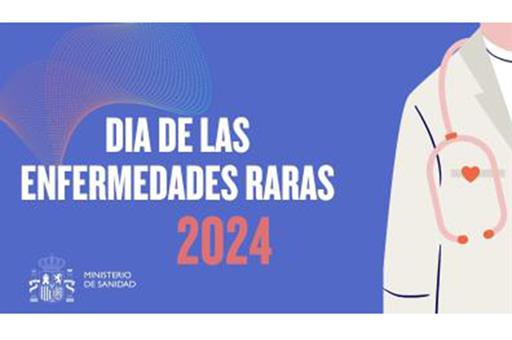Last year, the Ministry of Health approved the funding of 21 orphan drugs for rare diseases, the highest number ever
News - 2024.2.29
The Ministry of Health has approved funding for 21 new orphan drugs in 2023, the highest number in history. In addition, it has invested 34 million euros in screening, orthoprostheses and humanisation of spaces for rare diseases, 50 million euros in the genomics catalogue and another 46 million euros in the UNICAS project to integrate and transform care for rare diseases.
Today, Thursday 29 February, is World Rare Disease Day. Since its creation in 2008, this day has played a pivotal role in building an international rare disease community that is multi-disease, global and diverse, but united in purpose.
Rare diseases affect more than 3 million Spaniards. Many of the 6,000 to 8,000 rare diseases manifest themselves during childhood, are life-threatening and devastating, and represent a major burden for affected individuals and their families.
Taking advantage of World Rare Disease Day, last Tuesday the Ministry of Health presented the "Evaluation Report of the Rare Diseases Strategy of the National Health System 2024" to the institutional and technical committees of the aforementioned strategy. This report, which will be submitted for approval to the Interterritorial Council of the National Health System (CISNS), represents a milestone in the comprehensive approach to rare diseases in Spain and is a valuable tool in understanding the current situation of these pathologies in the country.
The Rare Diseases Strategy, approved in 2009 and updated in 2014, has been driven and promoted by the Ministry of Health in collaboration with the regional governments, integrating the contributions of scientific associations, health professionals, patients and relatives through their organisations, thereby consolidating a complete and holistic vision.
The report highlights the creation of alliances in rare disease translational research, the importance of regional government plans, their alignment with European guidelines and the allocation of resources, demonstrating the commitment and involvement of the general administration and the regional governments.
Among the items progressed are improvements in clinical management, designation of European Reference Networks, CSURs and Regional Reference Units, care networks, research and treatment projects, as well as training programmes for carers and family members.
In addition, the State Register of Rare Diseases (ReeR), established by Royal Decree 1091/2015, stands out as an essential tool for understanding and addressing the complexities of rare diseases in Spain. By consolidating regional registers, this system represents a milestone in the management of information on these pathologies, becoming one of the first population-based surveillance systems for chronic diseases at a national level.
The latest ReeR report published (2023) provides epidemiological information on the situation of rare diseases in Spain in the period 2010-2020, which is very useful to guide health planning and management in the field of rare diseases.
Commitment
On this World Rare Disease Day, the Ministry of Health reaffirms its commitment to the community of patients, families, caregivers, health professionals, researchers and organisations so that rarity of disease does not mean invisibility.
In this regard, it is important to recognise that, despite the progress made, there are many challenges ahead in terms of early detection, the best possible care close to where patients live and a continuity of care that improves the quality of life of patients and their families.
That is why the Ministry continues to work to overcome these challenges by coordinating stakeholders and allocating specific funds for rare diseases.
Non official translation





